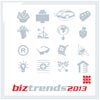[2013 trends] 'Goodvertising' - the key to brand leadership
![[2013 trends] 'Goodvertising' - the key to brand leadership](https://biz-file.com/c/1301/122477.jpg)
The way we market products is changing as consumers want and demand more meaningful conversations with brands and as businesses slowly realise that their licence to operate is being threatened, what with rising energy and resource costs and stricter demands from stakeholders.
This is a macro trend no marketer can ignore as their much valued brands are at stake and consumers begin to ask different questions: What is your brand doing for me and my children? What's your brand's attitude to unemployment? Why do you produce food with such high fat and sugar content when our country has huge obesity problems?
The brands that win will be those that embrace this shift and show care towards people and planet - mark my words. I dub this movement 'Goodvertising' - it combines what's good for people and planet with what's good for brand and bottom-line.
- Sustainability is the new USP
The usual sales pitch is under pressure. As an advertising industry, we're in the business of creating relevant brand stories about why brand X is better than brand Y.
In the early '40s, Rosser Reeves of Ted Bates & Company spoke about unique selling propositions (USPs) to show how brands should be built on one unique point of difference, for example, a tooth paste giving you the whitest smile. As one toothpaste has now become a thousand, this is no longer a meaningful differentiator and it becomes increasingly difficult to tell a different brand story.
Sustainability offers a treasure chest of different stories that differentiate Brand Sustainable from Brand Run-of-the-Mill. When the outdoor company Patagonia said on Black Friday last year, "Don't buy this jacket," and urged consumers towards more mindful consumption, it challenged the accepted brand narratives and gained a lot of attention.
Sustainability is the new competition and if your brand doesn't own sustainability in its category like Heinz owns Ketchup, you're losing your voice in this new paradigm. When IBM launched its initiative 'Smarter Planet', it not only stood out from the competition, but the initiative delivered more than US$10 billion over five years to the bottom line. Something is working here.
- Responsibility is the new trust currency
A company's responsibility used to stop at the factory gate, often limiting public scrutiny to visible pollution or people getting immediately sick. Today, companies are responsible for their products all the way from production to usage to disposal.
The indirect consequences of using a product or service are also increasingly hitting the news headlines. Everyone today takes it for granted that smoking kills. The same feeling is gaining traction when we talk about high fat and sugar content in food all the way through to the harm inflicted by excessive alcohol consumption.
In France, for example, the law demands that all commercials selling food or beverages with a high sugar, salt or fat content should be clearly labeled with a health warning.
Your brand needs to prepare itself for this new era of responsibility where consumer trust is at stake and consumers are increasingly skeptical and critical. It offers risks, but also potential for the brands that understand and act on this new agenda.
- Taking a lead
This brings me to my last point. For brands, goodvertising offers a different story that can distinguish your brand, attract new customers, challenge competition, grow business, encourage innovation and moreover drag your brand out of the past and secure its lead in the future.
When you're doing your marketing plan for 2013, be sure to ask yourself the right questions. Maybe it's about finding one of your industry's biggest problems and turning it into potential.
That's what the restaurant chain Chipotle did with its commercial "Back to the Start", which challenges our current out-of-control industrialised food production and shows a new, more sustainable alternative where food is made in harmony with nature. The film exudes leadership and care from the brand. Business as usual is challenged.
Your brand has an unprecedented chance to grasp this new potential and stand out and become a leader. If you tell the right story, people will not only listen, they will follow.

- Bizcommunity Download: 2013 Biz Trends Report (pdf: 3MB)
- Bizcommunity Special Section: Biz Trends 2013
- Bizcommunity Search: 2013 trends
- Bizcommunity: Biz Trends 2013 twitterfall
- Twitter Search: #biztrends2013































